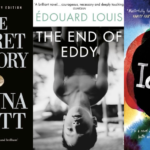This week features recommendations from Chidima Anekwe ’24, our wonderful Co-Editor-in-Chief.
Assata: An Autobiography by Assata Shakur
If you’ve given up on appealing to moral sense…One of the FBI’s “Most Wanted Terrorists,” Assata Shakur writes of her personal history and her rise as a political activist with ties to the Black Panther Party and the Black Liberation Army in the 70s. The autobiographical book begins with her childhood experiences of externally dealt and internalized racism, detailing both her journey to unlearning anti-blackness and the key moments that radicalized her. Culminating in her arrest and subsequent incarceration, Assata: An Autobiography acts as a sharp critique of the criminal justice system, from the cops to the “kourts” to the prisons alike.
You will like this book if: you feel yourself slipping into indifference to the U.S. government and are in the mood to be made really angry again.
The Bluest Eye by Toni Morrison
For the children who might have failed the doll test. In Toni Morrison’s debut novel, she tells the story of a young Black girl named Pecola struggling against the colorist, featurist beauty standards she’s faced with at school, in her neighborhood and within the larger Black community. It’s also a story of found family: Pecola is, for a time, a foster child living with a family more loving and stable than her own. They have two daughters, Claudia and Frieda, who become sisters to her, her only true allies in a cruel world. Through the flashbacks to the younger years of Pecola’s parents, we come to understand the ways generational trauma can breed deadly consequences.
You will like this book if: you had Eurocentric beauty standards shoved down your throat at all too young of an age. Or, if you just want to have that feeling like you’ve been punched in the gut for a few hours.
The Unbearable Lightness of Being by Milan Kundera
This book is not a romance. If that is what you are looking for, look elsewhere. Two men, two women, two life philosophies at work: lightness and heaviness. In Milan Kundera’s 1984 (no reference intended) philosophical fiction novel, he explores the intertwining narratives and romantic and sexual relationships of four characters as they navigate life as artists and intellectuals in the Prague Spring period. In each of their quests for fulfillment, or love, or maybe something else (the Kingdom of God on Earth?) they must pick a side: Nietzsche’s philosophy on a life of heaviness (eternal return), or Parmenides’s, on life as light.
You will like this book if: you are trying to decide whether or not you want a serious relationship or maybe just a situationship or if maybe romantic love is all an illusion. Also, if you think your opinions on things are better than everyone else’s.



